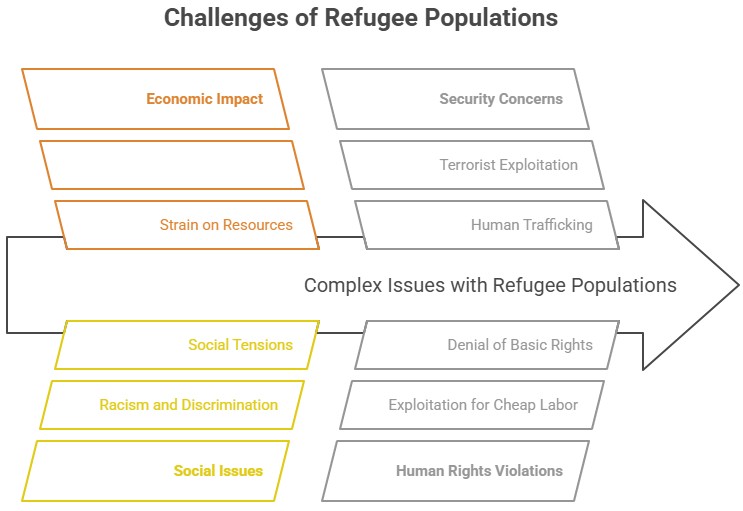Explore the global refugee crisis—from persecution and displacement to legal, social, and economic challenges. Understand why refugee rights are often seen as favors and discover solutions for inclusive, humane, and accountable asylum systems.

The global refugee crisis has intensified due to conflict, persecution, climate change, and economic instability, displacing millions across borders. Addressing their rights, safety, and integration remains a critical humanitarian and policy challenge.

The core issue in this scenario stems from the lack of empathy within the public of the host nation and limited resources at the ground level. These core reasons manifest themselves in following ways-
The essence of the resolution of the refugee crisis lies in the economic cost of refuge and its socio-political implications and the moral economy of asylum (Providing protection to refugees and the extent of humanitarianism among the host). Managing these two factors could provide a long-term solution to this crisis.


Refine your answer writing skills and elevate your UPSC preparation with personalized support and expert feedback.
Fill out the form to get started with the program or any other enquiries !








Are you dreaming of becoming an IAS officer? Then, IAShub can be your best guide. It is one of the Best IAS Coaching in Delhi. Many students who want to clear the UPSC exam join IAShub for learning. The institute gives both online and offline classes. Their teachers are experienced and helpful. They easily explain every topic. Students also get notes, tests, and tips to do well in the exam.
IAShub is in Delhi and is trusted by many UPSC students. It offers coaching for every part of the UPSC exam – Prelims, Mains, and Interview. The classes are simple and easy to understand. The teachers are experts and guide students in the right way. IAShub is also known for its helpful notes, test series, and answer-writing practice. IAShub is the best coaching in Delhi and also gives UPSC Online Classes. This helps students from any place in India to learn. The online classes are live and also recorded. So, students can watch them anytime. These classes cover the full UPSC syllabus.
Here are some important services provided by IAShub:
The UPSC Civil Services Exam has three parts:
This exam is tough, but with the right guidance, it becomes easy to manage. Students must study smart and stay regular.
IAShub supports students from the beginning to the end. It gives the right books, tests, and notes. The classes are easy to follow, and the teachers are always ready to help. Students get personal doubt sessions too. The test series and answer checking help students learn where they need to do better. Also, free study materials save time and money.
IAShub also guides students during the final stage – the interview. Experts take mock interviews and give useful tips. This full support makes IAShub one of the best IAS coaching in Delhi.